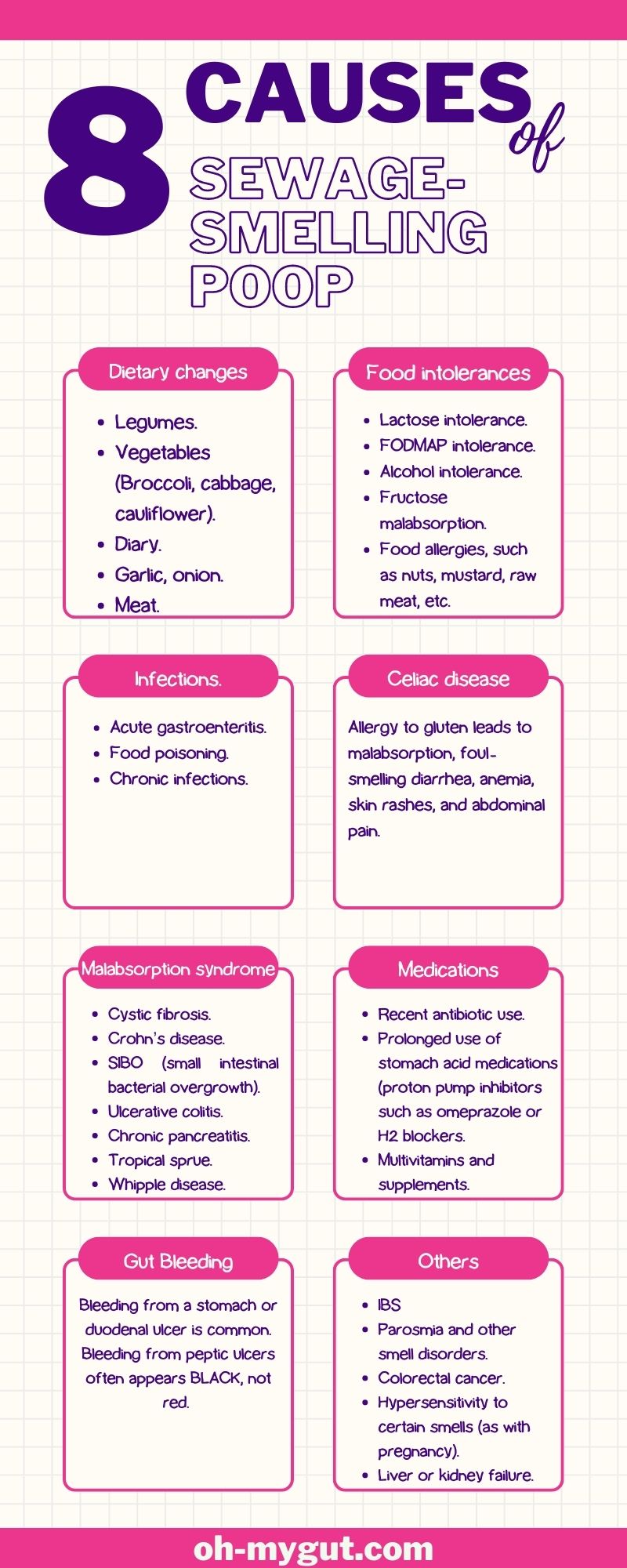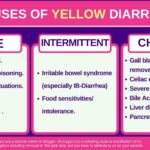Why does my Poop Smell Like Sewer Gas?
Our content is not intended nor recommended as a substitute for medical advice by your doctor. Use for informational purposes only.
Your poop may smell like sewer gas after eating certain foods, such as cruciferous vegetables, eggs, animal meat, and others. However, it may also reflect disease conditions such as malabsorption, food intolerance, or infection.
What is normal, and what are offensive stool smells?
Poop is formed mainly from the undigested and/or unabsorbed foods you previously ate. Most of the time, the bacteria in your gut break down foods like sugar and fat into smelly gases like methane and other sulfur compounds.
So, every poop is offensive. However, we periodically experience periods of very-offensive poop that may smell like sewer gas, sulfur, or methane.
Most of the time, things that aren’t diseases (mostly changes in diet) make the stool smell worse.
But poop that smells bad or like sewage could be a sign of a disease like an infection, a problem with digestion, or an intolerance to certain foods.
Today, you will learn about the most common causes of sewage-smelling poop and how to differentiate between disease and non-disease conditions.
Reasons why poop smells like sewer gas?

1. Dietary changes (the most common cause).
Food is the most common cause of the sewer gas smell in the stool. Some foods may contain a high amount of sulfur, which gives the poop its characteristic fishy or sewage smell.
Also, some foods are easier for the bacteria to break down and produce smelly gas as an end-product. These foods often contain short-chain carbohydrates that are highly fermentable (Fermentable Oligo-, Di-, or Monosaccharides and polyols or FODMAPs).
- Legumes.
- Vegetables (Broccoli, cabbage, cauliflower).
- Diary.
- Garlic, onion.
- Meat.
- Eggs.
- Dried fruits.
Consuming one or more of the above foods (especially in excess) leads to a sewage-like stool smell in many people. The stool smell is often temporary and is NOT associated with other abnormal symptoms such as abdominal pain, watery diarrhea, nausea, or vomiting.
However, some patients may have mild symptoms such as loose stools, flatulence (passing too much gas), or bloating.
2. Lactose intolerance.
Lactose is the main sugar in milk and most dairy products, such as cheese, yogurt, and ice cream.
Our intestines are often very capable of digesting lactose via an enzyme called lactase in our small intestine.
However, as we grow older, most people lose the ability to digest lactose, leading to lactose intolerance.
Lactose intolerance is a very common medical condition, affecting about two-thirds of the world’s population (reference). More interestingly, lactose intolerance prevalence may reach 100% in certain countries.
Symptoms include:
- Bloating.
- Nausea (and maybe vomiting).
- Passing smelly gases (sewer, fishy, or sulfur-smelling).
- Bulky sewage-smelling stools.
- Diarrhea or loose stool.
- Bulky, yellow, or fatty poop.
- The symptom onset and severity are related to the amount of dairy you eat. Symptoms often go away when you cut lactose from food.
We’ve discussed the issue before in these interesting articles:
- Can lactose intolerance go away?
- Can you develop lactose intolerance later in life?
3. Other forms of food intolerance and allergy.
Lactose intolerance is the most common form of food intolerance. However, you may be intolerant to various other types of food.
The term (intolerance) often refers to the inability of your digestive system to digest and absorb certain foods or food components, leading to their accumulation and fermentation by bacteria in the gut.
Also, others may experience a food-related reaction called a food allergy. A food allergy is a reaction from your immune system to certain foods. It is less common than food intolerances, but both conditions may cause your poop to smell like sewer gas.
The table below distinguishes between food intolerance and food allergy.
| Food intolerance | Food allergy |
|---|---|
| Affects 15-20% of the population | Affects nearly 2-5% of adults |
| Difficulty digesting certain types of food (not immune-mediated allergy). | An immune-mediated reaction to certain foods or food components. |
| Can cause “constant” or “chronic” attacks of diarrhea. | Usually causes acute attacks or is related to the ingestion of offending food. |
| Intestinal symptoms: diarrhea, extensive gas, bloating, and abdominal pain | Intestinal symptoms are the same |
| No extra-intestinal symptoms | Extra-intestinal symptoms like rashes, urticaria, swollen lips or face, or severe life-threatening allergic reactions. |
| The severity of your symptoms is proportional to the amount you eat from the offending food. | Even trace amounts of the offending food can produce severe symptoms. |
| Common offending foods: | Common offending foods: (examples) |
| • Lactose intolerance (dairy products). | • Raw meat and seafood. |
| • Fructose malabsorption. | • Nuts, peanut |
| • Alcohol intolerance. | • Mustard. |
| • FODMAP intolerance (as with People with IBS). | • Rice |
| • Raw meat and seafood. | • Some vegetables and fruits. |
4. Recent or chronic infections.
Acute gastroenteritis (viral, bacterial, or protozoal), food poisoning, and chronic infections (such as clostridium difficile infection) usually lead to foul-smelling stools.
The gut infection leads to the overgrowth of bad bacteria, viruses, or other microorganisms and temporary disturbances in the digestive process leading to abnormal stool smells.
A very offensive or sewage-like stool smell is particularly common with:
- Clostridium difficile infection.
- Giardiasis.
- Bacterial gastroenteritis.
Symptoms of acute gastroenteritis include:
- Acute onset diarrhea (typically severe, frequent, and watery).
- Often, the stool is more offensive than normal and may smell like sewer gas, especially with infections that induce malabsorption, such as giardiasis.
- Acute onset abdominal cramps.
- Nausea or vomiting.
- Fever (high-grade fever often indicates bacterial gastroenteritis).
- Body aches, fatigue.
- Severe anorexia (loss of appetite).
- Stool color changes, such as yellowish or green diarrhea.
5. Celiac disease.
Celiac disease affects about 1% of people worldwide (a relatively common disease). In this condition, the gut develops a severe allergic reaction to a protein called gluten, found in wheat, rye, and barely.
The allergic immune reactions lead to malabsorption, diarrhea, and smelly, bulky, pale stools.
The malabsorption often leads to severe anemia, pallor, skin rashes, and bloating.
Learn more about celiac disease.
6. Other forms of malabsorption syndromes.
Other malabsorption conditions may also lead to an offensive, sewage-like stool smell.
Common examples include:
- Cystic fibrosis.
- Crohn’s disease.
- SIBO (small intestinal bacterial overgrowth).
- Ulcerative colitis.
- Chronic pancreatitis.
- Tropical sprue.
- Whipple disease.
- Short bowel syndrome.
- Radiation colitis.
7. Some medications.
Many medications may affect stool smell directly (foul-smelling drug components) or induce bacterial overgrowth/infection.
Common examples:
- Recent antibiotic use.
- Prolonged use of stomach acid medications (proton pump inhibitors such as omeprazole or H2 blockers.
- Multivitamins and supplements.
8. Gastrointestinal bleeding.
Bleeding from a stomach or duodenal ulcer is common. Bleeding from peptic ulcers often appears BLACK, not red.
Blackish speckles in poop and fishy or sewage-smelling stool may indicate bleeding.
Always check your stool color for any blackish or reddish discoloration. Learn more about peptic ulcer bleeding and black stool.
9. Other causes:
Many other things can affect how your poop smells or how you smell it, such as:
- Irritable bowel syndrome poop may smell bad as many of IBS sufferers have FODMAP intolerance.
- Parosmia and other smelling problems often occur after covid-19 or due to other diseases.
- Pregnancy, ovulation, and psychiatric factors may lead to over-sensitivity to certain smells, including poop smells.
- Colorectal cancer.
- Endocrinal diseases that affect bowel movements, such as thyroid diseases.
- Liver or kidney failure.
Signs you shouldn’t ignore when you have a smelly poop?
As we explained before, most causes of occasional sewage-smelling poop are due to dietary changes and are often temporary and not associated with symptoms.
So, most cases are not a cause of concern unless the sewage-like stool smell is associated with:
- Severe watery diarrhea (often a sign of infection).
- Black stool (a sign of bleeding inside the gastrointestinal tract).
- Persistent or recurrent sewage-smelling stools with excessive gas and bloating (typically a sign of food intolerance).
- Weight loss.
- Severe abdominal pain.
- Severe or recurrent vomiting.
Best tips to prevent/treat sewage-smelling stools.
Preventing or treating sewer-like stool smell depends on the original cause.
Here are some tips to overcome this condition:
- Decrease the consumptions of food that may cause smelly poop, such as dairy, cruciferous vegetables, and animal protein.
- Stick to regular dietary habits and avoid major food changes.
- Lactose intolerance: void lactose, take lactase enzyme supplements, or use lactose-free products.
- Infections: often resolve spontaneously, but severe bacterial infections may need antibiotics.
- Avoid infections by sticking to personal hygiene and standard food safety measures.
- Celiac disease: a gluten-free diet.
- Limit the use of unnecessary medications and supplements.
- Evidence-based
- Written by a doctor.







